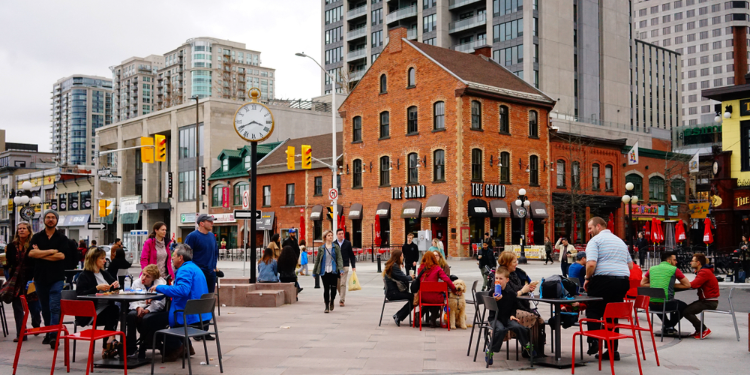
On November 1, Canada will announce its 2023-2025 Immigration Levels Plan. Each year, this plan resets permanent immigration targets for the next coming years. It gives a breakdown of how many newcomers of each migration class the country wants to welcome. The federal government is also intent on increasing immigration in Quebec despite the Quebecois government's opposition to it.
What can we expect in the Immigration Levels Plan 2023-2025?
Since it started leading the government in 2015, the Liberal Party of Canada, under the leadership of Justin Trudeau, has been incrementally increasing immigration targets. In 2016 and 2017, the target was 300,000 new permanent immigrants per year. This target rose to 310,000 in 2018, 330,000 in 2019 and 340,000 in 2020.
In 2021, to compensate for the negative impact that the pandemic had on immigration and international student enrolment, the government decided to exponentially increase the target to 401,000. The last Immigration Levels Plan of February 2022 (it was announced a few months late) set targets of 431,645, 447,055 and 451,000 for 2022, 2023 and 2024 respectively.
The plan that will be announced on November 1 might change the targets for 2023 and 2024. In light of the acute labor shortage in Canada and the pro-immigrant stance of the government until now, the targets are likely to be increased if changed. Indeed, Immigration Minister Sean Fraser has said that the target could reach 500,000 at some point in the next coming years, although he didn't specify exactly when.
About 60% of the immigration targets are reserved for economic migrants. These are working-age migrants with specialized skills and professional experience whose main motive is to find better job opportunities abroad. Canada is currently the leading country worldwide that is facing a labor shortage. In mid-2022, there were 70% more openings than in 2019, even as unemployment levels were at a historic low, reports RBC Thought Leadership. There simply are not enough workers, which is why continuously high economic immigration is important to keep the country running.
There are multiple Canadian visas for economic migrants, such as the Provincial Nominee Program (PNP), the Municipal Nominee Program (MNP), the Atlantic Immigration Program (AIP) and the Agri-Food Pilot Visa. The Express Entry visa, which works on a points-based system, also mainly targets economic migrants.
The remaining 40% of the national target concern family reunification and immigration on humanitarian grounds (i.e., asylum-seekers and refugees). There are more immigrants joining their family members who are permanent residents/citizens than there are refugees. From January to September 2022, there were 105,000 new family migrants as compared to only 8,250 new refugees.
Apart from an overall increase in yearly targets, another likely change in the Immigrations Level Plan 2023-2025 would be the allocation of more spots to the Provincial Nominee Program (PNP). Immigration Minister Sean Fraser has been discussing with provincial leaders about their labor needs and economic development goals. The academic/professional backgrounds of PNP immigrants will be matched with provinces that are suffering from skills shortages in specific fields. ScotiaBank, one of the country's major banks, has urged the government to ensure that economic migrants are sent to regions where they won't suffer from a job-education mismatch.
Quebec opposes the federal government's immigration goals
By virtue of being a historically French-speaking and culturally distinct region, Quebec is the Canadian province that enjoys the most freedom over its own governance. Under the 1991 Canada-Quebec Accord, the province has full control over its immigration targets. Additionally, it can select its economic migrants, has partial control over family reunification and humanitarian visas, and is in complete control of the settlement fund that Ottawa grants it to support newcomers with programs such as French training.
The French language is central to Quebec's identity. The conservative and nationalist party which heads the provincial government, Coalition Avenir Québec, wants to ensure that immigration doesn't affect the dominance of French in the region. The Quebec Skilled Worker Program (QSWP) for economic migration awards more points to French than English proficiency. In May 2022, the provincial government passed a new bill requiring small businesses to use French at work.
The leader of the Coalition Avenir Québec, François Legault, was re-nominated in the latest provincial elections on October 3 with a campaign that promised to keep Quebec's immigration target unchanged. That is, he wants to keep a yearly quota of 50,000 new permanent immigrants in Quebec. However, Justin Trudeau and Pablo Rodríguez, the Quebec-based Minister of Canadian Heritage, believe that the province has the ability to welcome at least 100,000 new immigrants per year. Currently, Quebec accounts for only 13% of the national immigration target, when, based on its size and demographic weight, it could help meet 23-28% of that target.
In parliament, the Prime Minister has said that Quebecois business owners he has met with are complaining about the difficulty of finding employees. This is a shortage that Trudeau says can be solved with increased immigration. He also believes that Quebec will realistically still be able to selectively choose French speakers even if it increases its immigration targets. There are indeed 300 million French speakers worldwide, with most native speakers concentrated in African countries with high emigration rates.
Quebec nationalists are angry at the federal government's attempt to interfere in their provincial matters. François Legault is now demanding more provincial autonomy from Ottawa over immigration matters, and the leader of another nationalist Quebecois party, Yves-François Blanchet of the Bloc Québécois, has said that Trudeau's words show “great contempt” (“mépris pitoyable”) towards the province. Discussions between Ottawa and Quebec are still underway, so no compromise has been announced yet concerning that disagreement.




















Comments